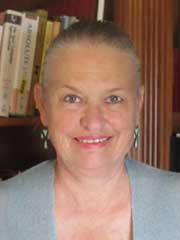Jennifer L. Anderson
Emeritus Faculty, Anthropology
jennifer.anderson@sjsu.edu
408-924-5561
What teaching questions currently preoccupy you?
It is not very exciting, but I am most preoccupied with finding ways to improve student writing. I am also always looking for new software or ways to use existing software that improves accessibility. My personal research is directed toward understanding the varied functions of ritual and the technical aspects of making ceramics for the Japanese tea ceremony. Because of my book, Introduction to Japanese Tea Ritual, I get emails from all over the world with questions about Tea.
What personal factors contributed to your study of anthropology?
I can’t remember a time when I did not want to be anthropologist. I am particularly drawn to the rich and changing tapestry of human cultural experience. Anthropologists are never bored—wherever there are people, we see something to learn.
What has been most challenging in your teaching?
The most challenging aspect of teaching at San José State is class size and the varied levels of the students’ preparation for college.
How has your position in SJSU contributed to your teaching?
I often tell my students that I am glad to teach at SJSU because of the variety of their cultural experiences. Students have very varied backgrounds and they respond well to hearing about difference.
A hidden talent:
My “not so hidden” talent is teaching Japanese tea ritual, which I have been doing for more than thirty years. I also make ceramics for the tea ceremony.
One book that changed your life and why:
The book that most changed my life was a cookbook. It is called Kaiseki: Zen Taste in Japanese Cooking by Kaichi Tsuji. I had been studying nutritional anthropology of the China area at Stanford and doing research in Taiwan. I was also teaching Chinese cooking, but I felt that it was too oily and did not include enough vegetables for a modern diet. The book by Kaichi Tsuji presented the formal cooking associated with the Japanese tea ceremony. It was a revelation because it was both artistic and healthy. I started studying tea ritual in the hope of learning kaiseki cooking. I ended up switching my area and writing my dissertation on tea ritual.
A website/journal/newspaper (in your field?) you follow without fail:
I teach Emerging Global Culture so I read BBC News and NPR news every morning.
Advice you’d give to newer faculty or students:
Be creative. Don’t feel you have to follow a certain path because of other’s expectations. The size of SJSU is an advantage. There is something for everyone. You must do your research.
RSCA Accomplishments
“Kristen Surak, Making Tea, Making Japan: Cultural Nationalism in Japan,” Japanese Studies 35(2) (September 2015): 262–264.
“Japanese Tea Ritual: ‘Ritual Play’ or ‘Play at Ritual’?” Proceedings of the Southwestern Anthropological Association, 7:47–50, 2013.
